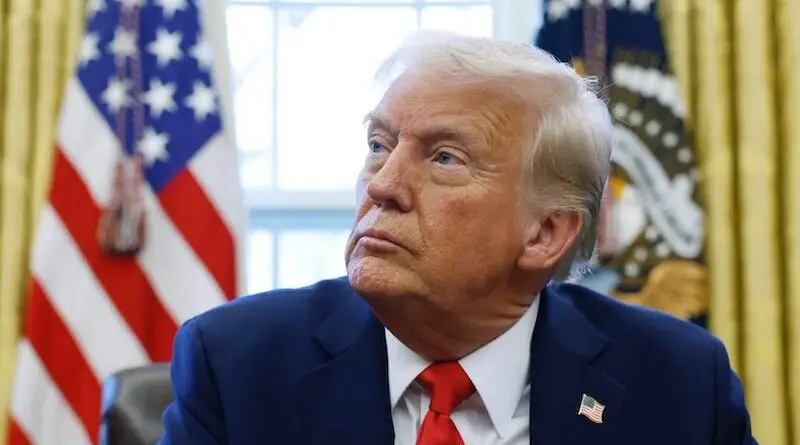Trump Says Tariff Deal With China Likely Within 3-4 Weeks
By RFA
By Taejun Kang
U.S. President Donald Trump said that Washington and Beijing were in talks on tariffs, expressing confidence that the world’s two largest economies would reach a deal over the next three to four weeks.
The U.S. and China are waging a tit-for-tat trade battle, which threatens to stunt the global economy, after Trump announced new tariffs on most countries. Specifically, the U.S. has imposed tariffs up to 145% on Chinese imports, prompting China to retaliate with tariffs reaching 125% on American goods.
“We are confident that we will work out something with China,” he said during a late Thursday afternoon executive order signing in the Oval Office.
“Top officials” in Beijing had reached out to Washington “a number of times” said Trump, adding that the two sides have had “very good trade talks” but that more remained, though he offered no evidence of any progress.
Asked about timing on any agreement, Trump said: “I would think over the next three to four weeks.”
Trump declined to say if he had spoken to Chinese President Xi Jinping.
He also declined to say whether he would raise further the current tariffs he has imposed on Chinese imports but said: “I may not want to go higher, or I may not want to even go up to that level. I may want to go to less, because, you know, you want people to buy.”
Trump also expressed confidence that the sale deal of Chinese social media app TikTok he seeks would be forthcoming.
“We have a deal for TikTok but it is subject to China so we will delay it until this thing gets worked out,” he said, adding that the deal would not take more than “five minutes” to finalize after discussions take place.
Trump said earlier in April that China’s objections to new U.S. tariffs stalled a deal to sell off TikTok and keep it operating in the United States.
Trump administration officials have been working on an agreement to sell the U.S. assets of the popular social media app, owned by China-based ByteDance, to an American buyer, as required by a bipartisan law enacted in 2024. But this also requires China’s approval.
Trump’s remarks came a few hours after China’s commerce ministry said it had been maintaining working-level communication with its U.S. counterparts.
“China’s position has been consistent – it remains open to engaging in economic and trade consultations with the U.S. side,” commerce ministry spokesperson He Yongqian said.
Noting that the unilateral imposition of tariffs was entirely initiated by the U.S. side, she quoted an old Chinese saying “It is the doer of the deed who must undo it” to urge the U.S. to correct its approach.
“We urge the U.S. to immediately cease its maximum pressure tactics, stop coercion and intimidation, and resolve differences with China through equal dialogue on the basis of mutual respect,” she said.
Nvidia chief’s visit to China
Jensen Huang, chief executive of U.S. chipmaker Nvidia, said on Thursday that China was a “very important market” for his company after the U.S. imposed a ban on sales of its H20 artificial intelligence chips to the country.
“We hope to continue to cooperate with China,” Huang said in a meeting with Ren Hongbin, head of the China Council for the Promotion of International Trade, cited by China’s state-run broadcaster CCTV.
Huang arrived in Beijing earlier in the day at the invitation of the trade organization.
His visit comes at a time when the U.S. imposed restrictions on the export of Nvidia’s H20 chips to China, tightening its grip on advanced AI technology trade with Beijing as part of Washington’s strategy to pressure China amid an ongoing tariff battle.
Nvidia said Tuesday it was notified by the U.S. government on April 9 that exporting its H20 chips to China would now require government approval. It separately said that the restriction would remain in place indefinitely.
While the H20 chip has relatively modest computing power, it has other features that make it suitable for building high-performance computing systems.
The U.S. government reportedly based its decision on concerns that the H20 chips could be used in or adapted for Chinese supercomputers. Until now, the H20 was the most advanced artificial intelligence chip legally exportable to China.
The H20 chip gained attention following its use by DeepSeek, a Chinese AI startup, which in January unveiled a cost-effective and competitive AI model trained using the chip.
Huang reportedly met DeepSeek founder, Liang Wenfeng, in Beijing, to discuss new chip designs for the AI company that would not trigger the new U.S. bans.

